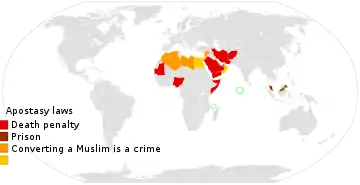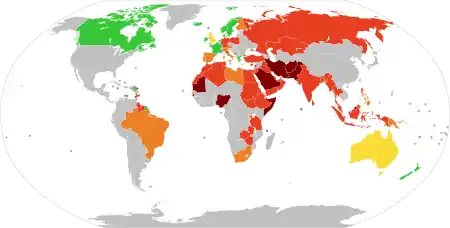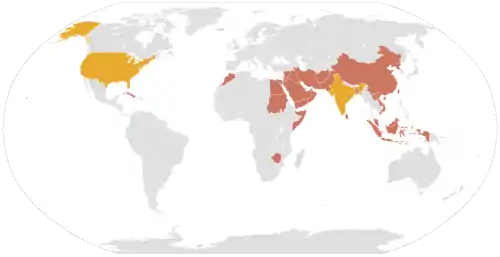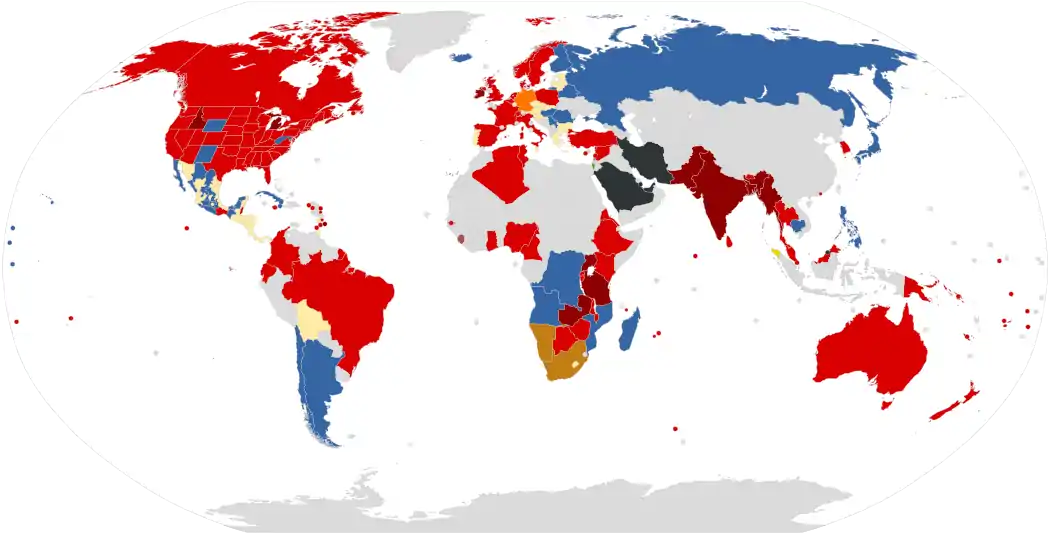Capital punishment for non-violent offenses
Capital punishment for non-violent offenses is allowed by law in many countries.
Adultery
Adultery: Afghanistan, Brunei, Iran, Maldives, Mauritania, Nigeria, Pakistan, Saudi Arabia, Somalia, United Arab Emirates, Yemen.
Apostasy and blasphemy
Apostasy means renouncing/abandoning/leaving one's religion for another religion (known as conversion) or irreligion (known as deconversion or disaffiliation, including to stances such as atheism, agnosticism and freethought). In the 21st century, this is considered a crime only for Muslims, in a limited number of countries and territories (25 as of 2014 according to Pew Research Center, all of which were located in Africa or Asia[1]), about ten of whom have the death penalty on it, while the other jurisdictions may inflict less severe punishments such as imprisonment, a fine or loss of some civil rights (in Jordan all civil rights), notably one's marriage and child custody.[1] Converting a Muslim to another religion or irreligion is sometimes also criminalised as being an 'accomplice to apostasy'.[2] Apostasy is not known to be a crime (let alone a capital crime) for adherents of any other religion in any country in the 21st century.[3] Article 18 of the Universal Declaration of Human Rights (1948) includes the 'freedom to change [one's] religion or belief', therefore any obstruction of apostasy is considered a human rights violation in international law.[3]
Blasphemy means insult, defamation or desecration/sacrilege of something that or someone who is deemed holy in one or more religions. Unlike apostasy, the religious status of the person suspected/accused of blasphemy is generally regarded as irrelevant; for example, a Muslim may be accused of 'blaspheming' a thing or person deemed holy by some Christians (or Christian organisation or authority), and vice versa, even if that thing or person is not 'holy' to the suspect. In the 21st century, blasphemy is much more widely criminalised than apostasy, in jurisdictions around the world, and is influenced by several religions including Christianity, Islam, Hinduism and Judaism.[1] As of July 2020, blasphemy could be punished by the death penalty in eight countries, all of which were Muslim-majority.[4]
In some jurisdictions influenced by Sharia (Islamic law), apostasy and blasphemy are closely linked offences. 'Apostasy', or 'public expression of apostasy', is sometimes considered a form/'evidence' of 'blasphemy' and is then prosecuted as such, even though 'apostasy' itself may not be a crime (example: Pakistan).[5] Likewise, 'blasphemy' is sometimes considered a form/'evidence' of 'apostasy' and is then prosecuted as such, even though 'blasphemy' itself may not be a (capital) crime (example: Qatar).[6] Furthermore, apostasy and blasphemy tend to be closely legally linked to atheism. Formally, being an atheist (or otherwise non-religious person) itself is not an offence in any country, but in practice it is difficult to be an atheist without being able to become an atheist (which is legally impossible for Muslims in many countries, some of which impose capital punishment) or while needing to keep it a secret to everyone that one is an atheist. Therefore, although there is a technical difference between becoming an atheist (a form of apostasy), being an atheist (atheism), and expressing that one is an atheist (which is considered a form of 'blasphemy' by some), some commentators frame the legal situation such that 'being an atheist is punishable by death'[7] or that 'atheism is punishable by the death penalty' in some countries.[8]
Apostasy

As of July 2020, apostasy by Muslims (ridda) carries the death penalty in the following countries: Afghanistan, Brunei, Iran, the Maldives, Mauritania, Qatar, Saudi Arabia, Somalia (implicitly), the United Arab Emirates, and Yemen. Malaysia's states Kelantan and Terengganu mandate the death penalty for apostasy, but federal law prohibits execution for this purpose, and so, it is never implemented in practice.[2] Likewise in Nigeria, some northern states have adopted Sharia law, although execution for apostasy would violate the Federal Constitution, and it's therefore unclear whether death sentences are actually carried out.[9]
- Afghanistan: 'According to the Article 1 of the Penal Code, crimes of Hudud and Qisas including apostasy are inflicted in accordance with the Hanafi Jurisprudence of Sharia law, which includes death punishment for non-believers and apostates.'[10]
- Algeria: 'Since 2006, proselytizing by non-Muslims has been illegal and carries a fine of up to EUR 10,000 and a maximum of five years in prison and non-Muslim missionary groups are only allowed to conduct humanitarian activities. Distribution of materials which may “shake the faith” of a Muslim or “undermine the Islamic faith” is also prohibited. Apostasy is not expressly penalized, but draws consequences partially in the family law. Prior to the 2005 amendments, family law stated that if it is established that either spouse is an “apostate” from Islam, the marriage will be declared null and void (Article 32). The term “apostate” was removed with the amendments, however those determined as such still cannot receive any inheritance (Article 138).'[11]
- Brunei: Section 112(1) of the 2013 Syariah (Sharia) Penal Code (fully implemented in 2019) makes a Muslim who declares himself non-Muslim punishable by death, or with imprisonment for a term not exceeding thirty years and corporal punishment, depending on the type of evidence. If a Sharia Court is satisfied that the accused has repented, the Court must order an acquittal.[5][12]
- Iran: Apostasy is not explicitly defined in Iran's civil or criminal legislation, but 'according to Article 167 of the constitution: 'The judge is bound to endeavor to judge each case on the basis of the codified law. In case of the absence of any such law, he has to deliver his judgment on the basis of authoritative Islamic sources and authentic fatwa.' And Sharia law has been used to punish Muslim apostates with the death penalty.[13] In 1989, Hossein Soodmand, who converted from Islam to Christianity and was a pastor of the Assemblies of God, was executed for apostasy.[14] The last time anyone was reportedly executed for apostasy in Iran was in 1990.[5]

- Malaysia: Apostasy is not a federal crime.[15] Islamic apostasy laws differ from state to state.[16] Malaysia's states Kelantan and Terengganu mandate the death penalty for apostasy, but federal law prohibits execution for this purpose, and so, it is never implemented in practice. The maximum punishment any state can currently convict a Muslim apostate to is 3 years imprisonment.[2]
- Maldives: 'While many religious ‘crimes’ are not individually spelled out under the penal code, wide berth is given for the prosecution of ‘hudud‘ crimes under Sharia law. The penal code grants judges discretion to impose Sharia penalties, including apostasy and blasphemy.' In June 2010, Mohammed Nazim who had publicly declared himself a former Muslim, was arrested by police and given religious counselling by the Islamic Ministry in prison to repent or be executed; Nazim repented and was released.[17]
- Mauritania: 'In 2018, Mauritania enacted a law which makes the death sentence for apostasy compulsory.'[18]
- Nigeria: 'The Nigerian Constitution protects freedom of religion and allows religious conversion. Section 10 of the constitution states, ‘The Government of the Federation of a State shall not adopt any religion as State Religion.’ However, sections 275–279 of the Constitution give constituent states the power to establish their own Sharia courts on civil matters. Abiding by Sharia law is required for Muslims in some states but optional in others and enforcement differs by state. Rulings and procedures are sometimes difficult to find.'[19] Although the states of Nigeria have a degree of autonomy to adopt their own laws, the first paragraph of the Federal Constitution stipulates that any law inconsistent with the provisions of the constitution shall be void. The Sharia penal code does contradict the Constitution, yet the federal government has not made a move to restore this breach of the constitutional order, letting the northern Muslim-dominated states have their way and not protecting the constitutional rights of citizens violated by Sharia. It is unclear whether any of the 12 northern states that have adopted some Sharia legislation are carrying out the death penalty, which would violate the Federal Constitution.[9]
- Qatar: 'Converting to another religion from Islam is considered apostasy and remains a capital offence in Qatar' (Article 1.1 of Law 11 of 2004). 'A blasphemy accusation could be taken as evidence of apostasy' (rather than the other way around). 'However since 1971 no punishment for apostasy has been recorded.' On its own, blasphemy carries the maximum penalty of imprisonment.[6]
- Saudi Arabia: Saudi Arabia has no penal code, the Sharia function as the law of the land. 'Apostasy is criminalized and mandates a death penalty. The criminal accusation of “apostasy” is sometimes deployed against people (including writers, activists, artists, or lawyers) who show any serious sign of pushing at the outer boundaries of freedom of expression, or who are critical of the religious authorities, and whose views (rightly or wrongly) are termed “atheist” or as “insulting to religion”. These laws are actively utilized.' Blasphemy (conceived as 'a deviation from Sunni Islam') is frequently considered a form of apostasy and may be prosecuted as such (contrary to other jurisdictions, where apostasy is sometimes considered a form/evidence of blasphemy). In a 2012 incident, Saudi authorities detained two men and charged them with apostasy for adopting the Ahmadiyya interpretation of Islam.[5][20]
- Somalia: 'The 2012 provisional federal constitution of Somalia does not explicitly prohibit apostasy, but does state that Sharia law comes before federal law.' (2012 Federal constitution 'Article 2: State and Religion. (3) No law can be enacted that is not compliant with the general principles and objectives of Shari'ah.') Since execution for apostasy is the regular punishment in Sharia law, it is presumed that apostasy in Somalia carries the death penalty. In addition, the federal constitution (Article 2), the Somaliland constitution (Article 5.1), and the Puntland constitution (Article 6) all prohibit the propagation of any other religion than Islam, and the latter two also explicitly prohibit Muslim apostasy (Somaliland constitution 'Article 33: Freedom of Belief 1. Every person shall have the right to freedom of belief, and shall not be compelled to adopt another belief. Islamic Sharia does not accept that a Muslim person can renounce his beliefs.'; Puntland constitution 'Article 24: Freedom of Faith. 1. No one can be forced to a faith; different from his/her believes. 2. The Muslim person does not have the right to convert from the Islamic faith.'), though the punishment is not clear.[21]
- United Arab Emirates: 'All citizens of the UAE are deemed to be Muslims. Conversion to other religions (and by implication, advocacy of atheism) is forbidden and the legal punishment for conversion from Islam is death (Article 1 and 66 of the Penal Code), although there have been no known prosecutions or legal punishments for apostasy in court.'[22]
- Yemen: 'The act of “apostasy” is punishable by death. Under Yemeni law “denouncing Islam” or any blasphemy conviction may constitute evidence of “apostasy”. While the rate of capital punishment in Yemen is very high, the government does not enforce the death penalty for apostasy in practice: the law allows those charged with apostasy three opportunities to repent, which absolves them from the death penalty. It is unclear whether a moratorium is in place or whether an “apostate” who refused to repent would face the death penalty. Family law prohibits marriage between a Muslim and an apostate; by law, apostates have no parental or child-custody rights.'[23]
Blasphemy

As of July 2020, blasphemy can be punished by death in Afghanistan, Brunei, Iran, Mauritania, Nigeria (some northern states), Pakistan, Saudi Arabia and Somalia (al-Shabaab-controlled areas).[4]
- Afghanistan: Blasphemy law in Afghanistan is defined by the Penal Code of 1976, which addresses "Crimes Against Religions", but leaves the issue of blasphemy to Sharia. Sharia permits the authorities to treat blasphemy as a capital crime. The authorities can punish blasphemy with death if the blasphemy is committed by a male of sound mind over age 18 or by a female of sound mind over age 16. Anyone accused of blasphemy has three days to recant. If an accused does not recant, death by hanging may follow.[24]
- Brunei: Capital punishment in Brunei was introduced for blasphemy in April 2019, but under heavy international pressure, the sultan of Brunei announced a moratorium on the death penalty while defending the legislation overall. Various offences of the new Sharia-based penal code which could be framed as 'blasphemy' include 'Propagation of religion other than religion of Islam' (Article 209), printing, disseminating, importing, broadcasting, and distributing of publications deemed contrary to Sharia (Articles 213, 214 and 215), non-Muslims using 'Allah' as the name of their god (for example, Bruneian Christians), 'Contempt etc. of religious authority' (Article 230), 'Incitement to neglect religious duty' (Article 235), amongst other Hudud crimes.[12]
- Iran: The Islamic Republic of Iran has a penal code that is heavily influenced by Sharia. Amongst the religious offences that may be punished with execution are insulting the prophet Muhammad, and moharebeh, usually translated as 'enmity against God'. The regime periodically executes dozens of prisoners, usually by hanging, by merit of religious offences. In practice, many of the executions seem not so much aimed at nonbelievers or religious dissenters, but at punishing political protests against the theocratic government, which argues that any opposition to its divinely granted authority is opposition to Allah himself, and therefore blasphemous. However, a legal clause provides that if a suspect professes that the insult was a mistake or made in anger, the sentence may be converted to 74 lashes instead of hanging.[13]
- Mauritania: In 2018, Mauritania upgraded its punishment for blasphemy from imprisonment to death and made it compulsory; convicts were no longer given the option of repentance within three days to go free.[18]
- Nigeria: Blasphemy law in Nigeria allows a suspect to be condemned for blasphemy via the Customary system and the Sharia system.[19] Although this prohibition against blasphemy in the Criminal Code and in Sharia is potentially unconstitutional, since the Federal Constitution's Section 38 entitles every Nigerian to freedom of thought, conscience, and religion, and Section 39 gives every Nigerian the right to freedom of expression,[25] death sentences for blasphemy are frequently carried out in some of the 12 northern states that have implemented Sharia, such as Kano State in 2015 and 2016. Moreover, five Muslim vigilantes who reportedly hacked a Christian woman to death for 'blaspheming the prophet Muhammad' on 2 June 2016 were all acquitted of murder by the Sharia court of Kano State.[19]
- Pakistan: Blasphemy in Pakistan is criminalised by Penal Code Articles 295 to 298. Only blasphemy under 295-C may be punished with the death penalty. It states: 'Use of derogatory remarks, etc., in respect of the Holy Prophet: Whoever by words, either spoken or written, or by visible representation or by any imputation, innuendo, or insinuation, directly or indirectly, defiles the sacred name of the Holy Prophet Muhammad (peace be upon him) shall be punished with death, or imprisonment for life, and shall also be liable to fine.'[26] 'Apostasy' is sometimes considered 'evidence' of 'blasphemy' and is then prosecuted as such, even though 'apostasy' itself is not a crime in Pakistan.[5]
- Saudia Arabia: Blasphemy is conceived as 'a deviation from Sunni Islam' and therefore considered a form of apostasy, and may be prosecuted as such (contrary to other jurisdictions, where apostasy is sometimes considered a form/evidence of blasphemy). Because apostasy carries the death penalty, blasphemers are executed, usually by beheading or crucifixion. It is unclear whether blasphemy itself would be separately punishable if there was no prohibition on apostasy.[20][27]
- Somalia: Due to the ongoing Somali civil war, the militant group Al-Shabaab is able to impose the death penalty for blasphemy in the areas it controls. On the other hand, the 1963 Criminal Code, which applies in the rest of the country, at most punishes 'blasphemy' and 'defamation of Islam' by up to two years in prison. The 2012 provisional federal constitution of Somalia and the Puntland and Somaliland regional constitutions, despite acknowledging the freedom of expression, all prohibit the promotion/propagation of religion other than Islam, though the punishment that the internationally recognised government and regional governments would apply for it is not clear.[21][28]
Corruption
Corruption: China, Cuba (minor's corruption), Indonesia (some acts of corruption which damage national economy/finances), Iran (corruption on Earth), Morocco, Thailand (bribery), Vietnam (bribery).
Drug trafficking

Drug trafficking: Bahrain, Bangladesh, Brunei, China, Cuba, Democratic Republic of the Congo (only in wartime), Egypt, India (option when second conviction for drug trafficking in quantities specified), Indonesia, Iran, Iraq, Jordan, Kuwait, Laos, Libya, Malaysia, Myanmar, North Korea, Oman, Qatar, Pakistan, Saudi Arabia, Singapore, South Korea, South Sudan (if aggravated circumstances), Sri Lanka, Sudan, Syria, Taiwan, Thailand, United Arab Emirates, United States (only under certain conditions), Vietnam, Yemen.
Espionage
Espionage: Afghanistan, Algeria, Bahrain, Bangladesh, Barbados, Botswana, Burkina Faso, Cameroon, Central African Republic, Chad, China, Cuba, Democratic Republic of the Congo, Egypt, Equatorial Guinea, Eritrea, Ethiopia, Guatemala, India, Indonesia, Iran, Iraq, Jordan, Kuwait, Laos, Lebanon, Liberia, Libya, Mali, Mauritania, Morocco, Niger, North Korea, Oman, Pakistan, Palestine, Peru, Qatar, Saudi Arabia, Somalia, South Korea, Sudan, Syria, Thailand, Tunisia, United Arab Emirates, United States, Vietnam, Yemen.
Fraud
Fraud: China, Vietnam.
Homosexuality and sodomy

Homosexuality and sodomy: Afghanistan, Brunei, Iran, Mauritania, Nigeria, Pakistan, Qatar, Saudi Arabia, United Arab Emirates, Yemen.
In July 2020, the sodomy law of Sudan, that previously punished gay men with up to 100 lashes for the first offence, five years in jail for the second and the death penalty the third time around, was abolished, with new legislation reducing the penalty to prison terms ranging from five years to life.[29]
Perjury
Perjury causing the execution of an innocent person: Afghanistan, Algeria, Bahrain, Bangladesh, Brunei, Central African Republic, Egypt, India, Iran (only in case of recidivism for capital sexual offences), Kuwait, Malaysia, Mauritania, Morocco, Myanmar, Niger, Nigeria, Oman, Pakistan, Qatar, Singapore, South Sudan, Sri Lanka, Sudan, United Arab Emirates, some U.S. States (California, Nebraska and Colorado), Yemen. Most U.S. states, as well as most countries around the world that retain the death penalty, would normally consider perjury causing execution of an innocent person as murder and punish it the same way; often by death or life without parole. In Nebraska and Colorado, perjury causing execution of an innocent person is considered by law as an act of first-degree murder, punishable by death or life without parole, whereas in California, perjury causing execution of an innocent person is a separate offense, and is separated from any of its murder laws, and is also punishable by death or life without parole, whereas first-degree murder is punished by death, life without parole or 25 years to life in prison. Some countries, such as Morocco, Mauritania and the Central African Republic punish perjury by death when any person who is innocent has been sentenced to death for any reason. Even if such execution does not occur, perjury causing someone to be sentenced to death in itself is a death-eligible offense in these countries.
Prostitution
Prostitution: Bangladesh (only forced prostitution), China (only forced prostitution), Cuba (child prostitution), Iran,[30][31] North Korea, Sudan, Yemen.
Sorcery and witchcraft
Sorcery and witchcraft: Central African Republic, Saudi Arabia,[32][33] Iran.
Theft
Theft: Afghanistan, Algeria (aggravated theft), Cameroon (aggravated theft), China, Iran (recidivist theft), Saudi Arabia (recidivist theft), Iraq, North Korea (grand theft).
Treason
Treason: Afghanistan, Algeria, Antigua and Barbuda, Bahamas, Bahrain (collaboration with foreign hostile country), Bangladesh, Barbados, Belarus, Belize, Botswana, Brunei, Burkina Faso, Cameroon, Central African Republic, Chad, China, Cuba, Democratic Republic of the Congo, Dominica, Egypt, Equatorial Guinea, Eritrea, Ethiopia, Gambia, Ghana, Grenada, Guatemala, Guinea, Guyana, India, Indonesia (high treason), Iran, Iraq, Israel (high treason), Japan, Jordan, Kenya, Kuwait, Laos, Lebanon, Lesotho, Liberia, Libya (high treason), Malawi, Malaysia, Maldives, Mali, Mauritania, Morocco, Myanmar (high treason), Niger, Nigeria, North Korea, Oman, Pakistan, Palestine, Papua New Guinea, Peru, Qatar, Saint Kitts and Nevis, Saint Lucia, Saint Vincent and the Grenadines, Saudi Arabia, Sierra Leone, Singapore, Somalia, South Korea (conspiracy with foreign countries), South Sudan, Sri Lanka, Sudan, Swaziland, Syria, Taiwan, Tanzania, Thailand (high treason), Tonga, Trinidad and Tobago, Tunisia, Uganda, United Arab Emirates, United States (Federal and in some individual States like Arkansas, California, Georgia, Louisiana, Mississippi, Missouri, and Vermont; Vermont keeps death penalty for treason, but has abolished it for murder), Vietnam, Yemen, Zambia (high treason), Zimbabwe (high treason).
Zoophilia

Zoophilia: Brunei, Iran, Niger, Nigeria, Qatar, Saudi Arabia, United Arab Emirates.
There have been no recorded executions so far.
Others
In the Central African Republic, one can be executed for charlatanism.
See also
References
- Angelina E. Theodorou (29 July 2016). "Which countries still outlaw apostasy and blasphemy?". Pew Research Center. Retrieved 15 July 2020.
- Jerry Choong (16 January 2020). "G25: Apostasy a major sin, but Constitution provides freedom of worship for Muslims too". Malay Mail. Retrieved 13 July 2020.
- Saeed, Abdullah (2015). "Limitations on religious freedom in Islam". Routledge Handbook of Law and Religion. Abigdon / New York: Routledge. p. 369–370. ISBN 9781135045555. Retrieved 16 July 2020.
'Laws of apostasy and punishment using the death penalty gradually lost their importance in [Western] societies. In the face of this global trend, today [2015], Islam seems to be the only major religion to maintain that conversion away from the religion (apostasy) must be punished with death In a number of Muslim-majority countries such as Saudi Arabia, apostasy laws and the associated death penalty still prevail.'
- "Blasphemy Laws By Country". End Blasphemy Laws. Humanists International. 2020. Retrieved 15 July 2020.
- Hanibal Goitom (May 2014). "Laws Criminalizing Apostasy in Selected Jurisdictions" (PDF). Library of Congress. Retrieved 14 July 2020.
- "Qatar". Freedom of Thought Report. Humanists International. Retrieved 14 July 2020.
- Siobhan Fenton (30 March 2016). "The 13 countries where being an atheist is punishable by death". The Independent. Retrieved 16 July 2020.
- Maryam Namazie, Nahla Mahmoud, Atoosa Khatir, Ross Khorenjenko and Sai Naeini (August 2017). "Political and Legal Status of Apostates in Islam" (PDF). Council of Ex-Muslims of Britain. Retrieved 16 July 2020.CS1 maint: multiple names: authors list (link)
- Harnischfeger, Johannes (2008). Democratization and Islamic Law: The Sharia Conflict in Nigeria. Frankfurt am Main: Campus Verlag. p. 106. ISBN 978-3593382562.
- "Afghanistan". Freedom of Thought Report. Humanists International. Retrieved 14 July 2020.
- "Algeria". Freedom of Thought Report. Humanists International. Retrieved 14 July 2020.
- "Brunei". Freedom of Thought Report. Humanists International. Retrieved 14 July 2020.
- "Iran". Freedom of Thought Report. Humanists International. Retrieved 14 July 2020.
- "Jesus Prince of Persia". Interserve Australia. 1 January 2009. Retrieved 14 July 2020.
- "Malaysia probes atheist group after uproar over Muslim apostates". Reuters. 7 August 2017. Retrieved 13 July 2020.
- "Dropping the Muslim status officially in the Shariah courts". Malay Mail. July 2014. Retrieved 13 July 2020.
- "Maldives". Freedom of Thought Report. Humanists International. Retrieved 14 July 2020.
- "Mauritania". Freedom of Thought Report. Humanists International. Retrieved 14 July 2020.
- "Nigeria". Freedom of Thought Report. Humanists International. Retrieved 14 July 2020.
- "Saudi Arabia". Freedom of Thought Report. Humanists International. Retrieved 14 July 2020.
- "Somalia". Freedom of Thought Report. Humanists International. Retrieved 14 July 2020.
- "United Arab Emirates". Freedom of Thought Report. Humanists International. Retrieved 14 July 2020.
- "Yemen". Freedom of Thought Report. Humanists International. Retrieved 14 July 2020.
- "2008 Report on International Religious Freedom - Afghanistan". United States Department of State. 19 September 2008. Retrieved 2 July 2009.
- "Constitution of the Federal Republic of Nigeria 1999". Government of Nigeria. Retrieved 2 August 2009.
- Pakistan Penal Code Chapter XV "Of Offences Relating to Religion" pp. 79–81.
- "Saudia Arabia". End Blasphemy Laws campaign. Humanists International. 18 June 2020. Retrieved 17 July 2020.
- "Somalia". End Blasphemy Laws campaign. Humanists International. 18 June 2020. Retrieved 17 July 2020.
- Ban Barkawi, Rachel Savage (16 July 2020). "'Great first step' as Sudan lifts death penalty and flogging for gay sex". Reuters. Retrieved 17 July 2020.
- "Iran - Facts on Trafficking and Prostitution". Archived from the original on 8 October 2014. Retrieved 28 October 2017.
- "NTC - Bancadati. Iran". Hands Off Cain. Retrieved 28 October 2017.
- "Saudi man executed for 'witchcraft and sorcery'". BBC News. 2012-06-19. Retrieved 2017-05-20.
- Jacobs, Ryan. "Saudi Arabia's War on Witchcraft". The Atlantic. Retrieved 2017-05-20.